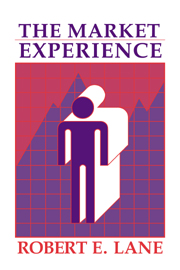Part III - Self-attribution and self-esteem
Published online by Cambridge University Press: 18 December 2009
Summary
The criteria for a successful market are its contributions to happiness (or utility) and to human development. Human development, in turn, is composed of the cognitive complexity we examined in Part II and of two other elements: a sense of personal control (which is based on self-attribution) and an appropriately high sense of one's own worth, self-esteem. Here in Part III I deal with these two additional elements of the developed personality, treating them more briefly than was thought necessary for cognitive complexity.
Chapter 9 relates the development of a sense of personal control to exchange, claiming that market exchange is the kind of contingent response situation that teaches people that when they act the environment responds. From such experiences of effective action people learn self-attribution, that is, that they are the (partial) causes of the events in their own lives. The correlates of a sense of personal control give it a high status among the elements of a developed personality, but the implied belief that each person controls his or her own fate risks both a false view of causal forces in the environment and an unattractive ethical perspective in which victims deserve their victimization. By itself, therefore, a sense of personal control, enlisting self-attribution as it does, is not a final good.
In Chapter 10 I take up the self-esteem that Rawls has called the most important of the primary goods.
- Type
- Chapter
- Information
- The Market Experience , pp. 155 - 156Publisher: Cambridge University PressPrint publication year: 1991



